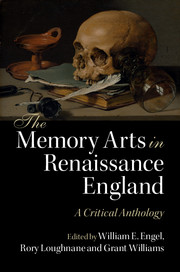Book contents
- Frontmatter
- Dedication
- Contents
- List of figures
- Acknowledgements
- A note on abbreviations
- Introduction
- PART I The art of memory
- Introduction to Part I
- I.1 Stephen Hawes, The Pastime of Pleasure (1509)
- I.2 [Laurence Andrewe], The Mirror of the World (1527)
- I.3 Peter of Ravenna, The Phoenix (1548)
- I.4 Guglielmo Gratarolo, The Castle of Memory (1562)
- I.5 Hugh Plat, The Jewel House of Art and Nature (1594)
- I.6 William Basse, A Help to Memory and Discourse (1620)
- I.7 John Willis, The Art of Memory (1621, 1661)
- I.8 Henry Herdson, Ars memoriae; the Art of Memory Made Plain (1651)
- I.9 Richard Saunders, Art of Memory (1671)
- I.10 Marius D'Assigny, The Art of Memory (1697)
- PART II Rhetoric and poetics
- PART III Education and science
- PART IV History and philosophy
- PART V Religion and devotion
- PART VI Literature
- Index
- References
I.2 - [Laurence Andrewe], The Mirror of the World (1527)
from PART I - The art of memory
Published online by Cambridge University Press: 05 August 2016
- Frontmatter
- Dedication
- Contents
- List of figures
- Acknowledgements
- A note on abbreviations
- Introduction
- PART I The art of memory
- Introduction to Part I
- I.1 Stephen Hawes, The Pastime of Pleasure (1509)
- I.2 [Laurence Andrewe], The Mirror of the World (1527)
- I.3 Peter of Ravenna, The Phoenix (1548)
- I.4 Guglielmo Gratarolo, The Castle of Memory (1562)
- I.5 Hugh Plat, The Jewel House of Art and Nature (1594)
- I.6 William Basse, A Help to Memory and Discourse (1620)
- I.7 John Willis, The Art of Memory (1621, 1661)
- I.8 Henry Herdson, Ars memoriae; the Art of Memory Made Plain (1651)
- I.9 Richard Saunders, Art of Memory (1671)
- I.10 Marius D'Assigny, The Art of Memory (1697)
- PART II Rhetoric and poetics
- PART III Education and science
- PART IV History and philosophy
- PART V Religion and devotion
- PART VI Literature
- Index
- References
Summary
About the author(s)
Gossuin (or Gauthier) of Metz (fl. 1245), a French priest, whose legacy rests chiefly on his composition of an early vernacular verse encyclopedia, L'image du monde. The work was then rewritten as prose, possibly by Gossuin himself. William Caxton (c. 1415/24–91) was a prominent merchant and diplomat, who brought the first printing press to England. He printed the first English translation of the French prose version, publishing it in 1481 and 1491. In 1527 Laurence Andrewe (fl. c. 1520–30) issued a third edition of this work featuring ‘some alterations and additions’. Little is known of Andrewe. His other works include a translation of Brunschwig's influential medical work on distillation, Liber de arte distillandi, and a translation of a work about the valuation of gold and silver.
About the text
The encyclopedia, often illustrated, was one of the most popular and widely circulated works in the late medieval period. It can be understood as a summary of medieval knowledge across many subjects, including metaphysics, grammar, logic, arithmetic, astronomy, geography and nature. The title page for the revised edition notes the many ‘marvels’ stored within, including ‘rhetoric, with the art of memory’. This edition's discussion of artificial memory, excerpted below, is a new addition to the encyclopedia.
The arts of memory
This excerpt constitutes the first extended English prose exposition of the techniques of the memory arts printed in England – see Stephen Hawes's poem The Pastime of Pleasure (I.1) – and it situates the memory arts firmly within the rhetorical tradition: ‘how thou shalt elegantly utter thy matter’. The author distinguishes between natural and artificial memory, compares the art with writing with ‘ink upon parchment’, and outlines the basic techniques involved in the mnemonics of places (loci) and images (imagines). He concludes with a discussion about the types of images to be used, advising that practitioners should use corporeal images to prompt their recollection. This is relatively straightforward if what is to be recalled is a corporeal thing; for example, if you wish to remember a certain person you should use that same person as your image. If you wish to remember an abstract concept, he instructs that you should still use a corporeal image; for example, he uses the image of an elderly man with white hair in place of ‘wisdom’.
- Type
- Chapter
- Information
- The Memory Arts in Renaissance EnglandA Critical Anthology, pp. 41 - 44Publisher: Cambridge University PressPrint publication year: 2016



